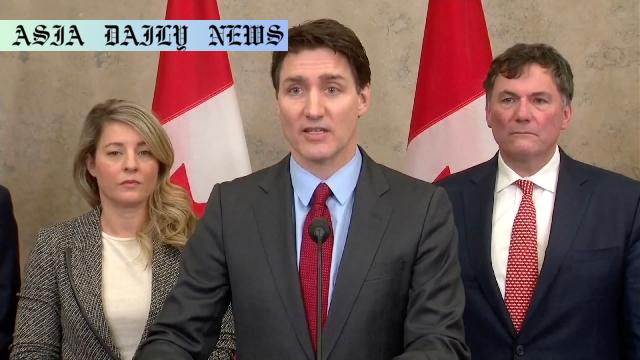Tariffs spark sharp economic reactions from Canada, Mexico, and China following the US’s contentious tariff announcement.
The US announces 25% tariffs on imports from Canada and Mexico, and 10% on goods from China.
Canada’s Prime Minister Trudeau announces retaliatory tariffs on US imports.
China plans to file a WTO complaint and implement reciprocal countermeasures.
Mexico denies US claims about alliances with criminal organizations and enforces trade measures.

Introduction: Tense Economies and Rising Tariffs
Tariff tensions have captured global attention as the United States moves forward with significant import tariffs, sparking reciprocal reactions from major trade partners, including Canada, Mexico, and China. These developments come amidst an already delicate global economic landscape. The new tariffs—25 percent on imports from Canada and Mexico, and 10 percent on Chinese goods—are seen as aggressive moves that could have far-reaching implications for international trade and diplomacy.
Canada’s Heavy Response
Canadian Prime Minister Justin Trudeau swiftly responded to the US announcement by implementing an identical 25 percent tariff on US imports. Trudeau emphasized that these measures were not taken lightly and warned of the broader economic impacts these tariffs could have on both Canadian and American citizens. By targeting specific US industries—including energy—Canada has aimed to apply strategic pressure to the US economy. During his press conference, Trudeau highlighted that cooperation, not confrontation, would be a more effective way to move forward in US-Canada relations.
Mexico Rejects US Accusations
Meanwhile, tensions between the US and Mexico have escalated beyond the economic realm. Following the White House’s claim of Mexican governmental alliances with criminal organizations, Mexican President Claudia Sheinbaum outright denied the accusations. In response to the tariffs, she instructed her administration to implement both tariff and non-tariff countermeasures to safeguard Mexico’s economic interests. This escalation represents a strong rejection of perceived interference in Mexico’s sovereignty, with Sheinbaum warning that the US’s approach could erode trust between the two neighboring nations.
China Takes Legal and Economic Action
China has expressed its strong dissatisfaction through official government channels, announcing plans to file a lawsuit with the World Trade Organization (WTO) in response to the US tariffs. According to the Chinese Ministry of Commerce, these tariffs are detrimental to the interests of both nations and the global economy. Additionally, China plans to implement reciprocal measures, though specific details have yet to be revealed. The Chinese government is leveraging its domestic and international platforms to rally opposition against the US measures, labeling them a step backward for global trade progress.
Implications for the Global Economy
The ramifications of these tariff escalations are already being debated. On one end, proponents of the US’s aggressive trade policy argue that it is essential to protect American industries and reduce trade deficits. Critics, however, warn of immediate consequences such as disrupted supply chains, increased costs for consumers, and retaliatory tariffs that will hurt export-dependent businesses. Beyond economic impacts, this move risks fostering mistrust and destabilizing long-term partnerships between nations.
Conclusion: A Challenging Road Ahead
The escalating trade war underscores the complexities of global trade in an interconnected world. The situations in Canada, Mexico, and China serve as prime examples of how unilateral decisions can lead to far-reaching consequences, both economic and political. With tariffs now at the center of contentious international relations, the coming months will reveal whether dialogue and compromise are possible or whether nations will double down on retaliation.
Commentary
Introduction: Navigating Complex Global Economics
The recent wave of tariffs initiated by the United States has sparked significant debate among global leaders and economic experts. While tariffs can sometimes serve as a powerful tool for protecting domestic industries, their use in this instance seems to favor short-term gains over long-term stability. The reactions from Canada, Mexico, and China reflect the deep frustrations many nations feel when unilateral decisions are made without considering broader implications.
Canada and Mexico: Defenders of Their Economic Sovereignty
It is clear that leaders like Justin Trudeau and Claudia Sheinbaum are unwilling to let these tariffs go unanswered. Their responses, both economically and politically, demonstrate a commitment to defending their country’s interests. For Canada, the additional tariffs may exacerbate already strained economic conditions, while in Mexico, the US’s provocative accusations have added a layer of diplomatic tension. These scenarios highlight the sheer complexity of balancing national pride with maintaining healthy cross-border relations.
China: A Strategic Approach
China’s response, involving legal action through the WTO alongside potential reciprocal measures, reflects its strategic approach to global competition. Rather than reacting impulsively, China appears to be leveraging the rules of international trade to strengthen its position and garner support. This calculated move could set the stage for a broader conversation about the US’s role in the global economy and its willingness to abide by international norms.
Conclusion: A Crossroads in Global Relations
In conclusion, these developments around tariffs highlight the challenges of navigating a rapidly changing global economic environment. While some may view tariffs as an assertive display of power, their long-term implications require careful consideration. As countries like Canada, Mexico, and China take action, it may be time to reflect on the need for collaboration over conflict in securing a robust and equitable global economy.


